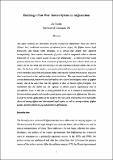| dc.description.abstract |
This paper examines key dimensions of justice in post-war Afghanistan. These are shari’a(Islamic law), traditional institutions of informal justice (jirga), the Afghan interim legalframework, and human rights principles. It is argued that despite their apparentincompatibility, these various dimensions of justice could be integrated within a coherentframework of a new justice system in post-war Afghanistan – a framework that wouldpromote interaction between local institutions of informal justice and a district level court ofjustice, on the one hand, and between these two and a proposed Human Rights unit, on theother. On the basis of this analysis, an experimental model of a system of justice is proposed,which integrates local jirga and Human Rights units into the existing formal justice (based onshari’a and positive law) and law-enforcement institutions. |

